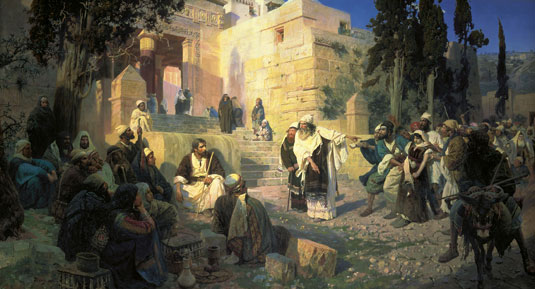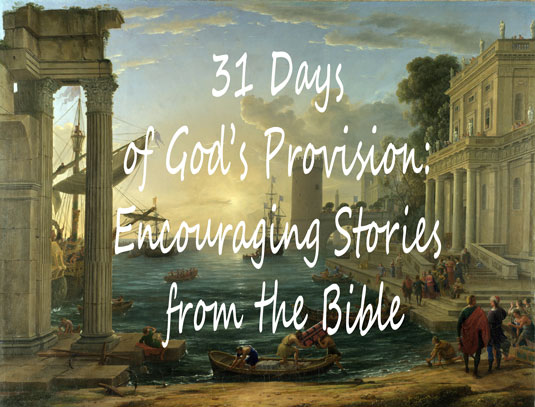 The story of the adulteress takes place during the time of Jesus’ ministry, when he was teaching, healing, and performing miracles. Whether in the temple courts or in an open field, crowds gathered to hear him speak. Many who heard his teachings or witnessed healings, believed that Jesus was the promised Messiah. Most of the religious leaders however, refused to believe that Jesus was the Christ, and saw him as a threat to their authority over the people. Jesus was a thorn in their side and they looked for ways to discredit him. They saw themselves as the “keepers of the law” and didn’t like usurpers, so they instruct the temple guards to go out and arrest him.
The story of the adulteress takes place during the time of Jesus’ ministry, when he was teaching, healing, and performing miracles. Whether in the temple courts or in an open field, crowds gathered to hear him speak. Many who heard his teachings or witnessed healings, believed that Jesus was the promised Messiah. Most of the religious leaders however, refused to believe that Jesus was the Christ, and saw him as a threat to their authority over the people. Jesus was a thorn in their side and they looked for ways to discredit him. They saw themselves as the “keepers of the law” and didn’t like usurpers, so they instruct the temple guards to go out and arrest him.
Finally the temple guards went back to the chief priests and the Pharisees, who asked them, “Why didn’t you bring him in?” “No one ever spoke the way this man does,” the guards replied. “You mean he has deceived you also?” the Pharisees retorted. “Have any of the rulers or of the Pharisees believed in him? No! But this mob that knows nothing of the law—there is a curse on them.” John 7:45-49, NIV
As our story opens, the religious leaders are presented with an opportunity to put this man Jesus in his place. With proud and arrogant hearts, they conspire together.
A woman had broken the law, and so the teachers of the law and the Pharisees bring her to Jesus in order to test him. Her crime was adultery and punishment under the law was death by stoning. The leaders want to see if Jesus will follow the law or dismiss it.
. . . “Teacher, this woman was caught in the act of adultery. In the Law Moses commanded us to stone such women. Now what do you say?” But Jesus bent down and started to write on the ground with his finger. John 8:4b-5,6b, NIV
What a peculiar thing to do. Jesus doesn’t answer them. Instead, he writes in the dirt. Some speculate that perhaps he wrote the names of her accusers alongside the commandments each one of them had broken.
When they kept on questioning him, he straightened up and said to them, “If any one of you is without sin, let him be the first to throw a stone at her.” Again he stooped down and wrote on the ground. At this, those who heard began to go away one at a time, the older ones first, until only Jesus was left, with the woman still standing there. John 8:7-9, NIV
With all the woman’s accusers gone, Jesus turns his attention to her.
Jesus straightened up and asked her, “Woman, where are they? Has no one condemned you?” “No one, sir,” she said. “Then neither do I condemn you,” Jesus declared. “Go now and leave your life of sin.” John 8:10-11, NIV
Although the law had condemned her, Jesus chose to grant her mercy and grace instead.
The religious leaders had missed the purpose of the law. It was never meant to make us holy, but to bring us to the realization that we cannot obtain righteousness on our own. The law cannot save us because we cannot keep it. Salvation comes only by God’s forgiveness through his son’s sacrifice. If mankind could have reached perfection by any other means, Christ would not have had to die for us. Jesus himself told us that there was no other way for reconciliation to occur.
Jesus answered, “I am the way and the truth and the life. No one comes to the Father except through me.” John 14:6, NIV
Peter reiterated this statement in the book of Acts.
“Salvation is found in no one else, for there is no other name under heaven given to men by which we must be saved.” Acts 4:12, NIV
We cannot reach God with our own efforts to follow all the rules or insure that the number of our good deeds out-weigh the number of our bad deeds. In stark contrast to the religious leaders who demanded a perfect keeping of the law, Jesus demanded only a contrite heart. He demonstrated mercy and offered forgiveness.
The Adulteress’s story was one of punishment, but God’s provision was one of grace.
Join me tomorrow for a story involving a faithful captive, a regrettable decree, and a provision of protection!
 If you’ve missed any part of this series, you can find all of the posts in the side bar category 31 Days of God’s Provision.
If you’ve missed any part of this series, you can find all of the posts in the side bar category 31 Days of God’s Provision.
On the journey toward Home,












{ 1 trackback }